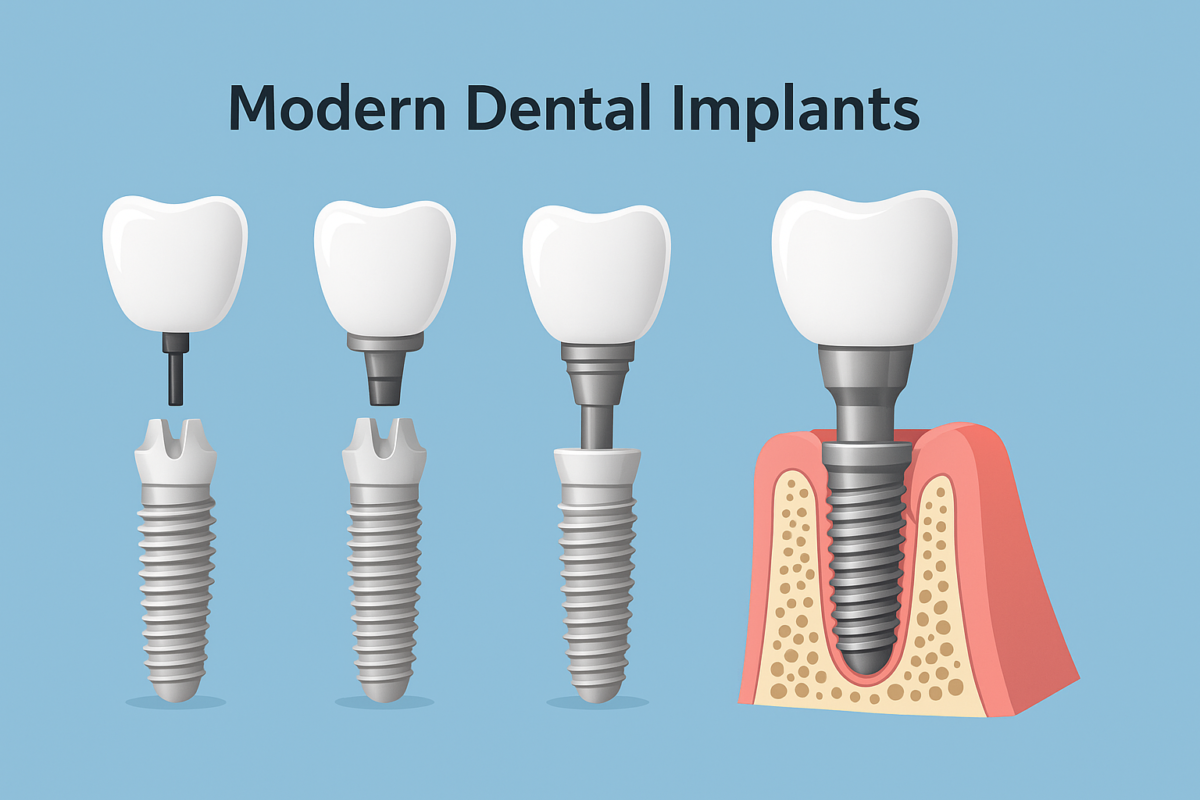Dental implants have evolved into one of the most advanced and successful options for replacing missing teeth. With the technology available today, the dental implant industry is rapidly thriving and innovating. However, despite all technological advancements, the most crucial determinant of long-term success remains the patient’s post-surgical care. How to care for dental implants after surgery is extremely important. Hence, we will go over the modern post-surgical dental implant care after surgery. The goal is to prepare you for the procedure and what comes after. Let’s take a look.
Overview of Modern Dental Implants
With global trends moving toward, the standard of care after implant surgery has improved dramatically. All thanks to minimally invasive techniques, biocompatible materials, and smart monitoring technology. Also, thanks to the innovators such as Anveli Dental. The pioneers of the dental industry who made dental surgeries and modern dental implants what they are today. True pieces of art. And today’s implants are predominantly crafted from titanium, providing enhanced strength, durability, and lower allergic responses. Innovation, such as laser-smoothened titanium surfaces, has improved osseointegration and reduced bacterial adhesion.

Moreover, smart dental implants are now entering mainstream dentistry. These are embedded with micro-sensors that transmit data on temperature, pressure, and even bacterial activity. Dentists can track early signs of infection, inflammation, or overloading without waiting for visible symptoms to emerge. Such technologies reflect a broader shift toward preventive and data-driven care. But they do not affect the significance of adequate dental implant care after surgery. As well as post-operative hygiene, diet, and routine follow-ups.
Immediate dental implant care after surgery is necessary
Healing and integration of the implant with the jawbone is known as osseointegration. It is directly influenced by patient behavior, hygiene, and professional monitoring. The first 24 to 72 hours post-implant surgery are pivotal. During this window, patients must follow strict guidelines to avoid disturbing the healing site. Key Instructions are:
- Bleeding Control – Slight oozing is normal. Bite on sterile gauze for 30–60 minutes immediately after surgery. Avoid spitting or using straws, as suction can dislodge blood clots.
- Swelling and Discomfort – Apply cold packs on the cheek in 15-minute intervals. Mild swelling may persist for up to 72 hours.
- Pain Management – Over-the-counter medications such as ibuprofen are effective unless contraindicated. If pain management is not working, dentists may approach it with stronger analgesics.
- Oral Hygiene – Do not brush the surgical area on the first day. From day two, gently rinse with a saltwater solution or prescribed mouthwash. Resume brushing adjacent teeth gently.
- Diet – Stick to soft foods such as yogurt, soup, mashed potatoes, and smoothies. Avoid hot, spicy, acidic, or crunchy foods that could irritate the surgical site.
- Smoking and Alcohol – Strictly avoid both for at least 7–10 days. Nicotine constricts blood vessels and impairs healing, while alcohol interferes with clotting and tissue repair.
Ongoing Implant Maintenance
After the initial recovery period, the next few months involve bone integration. Daily routine and regular dental visits are important. Here’s what dental implant surgery after care looks like:
- Brushing & Flossing – Use a soft-bristled toothbrush and non-abrasive toothpaste. Flossing should be done with unwaxed tape or special tools like interdental brushes.
- Water Flossers – These devices can help remove plaque and debris around implants. Especially under bridges or full-arch prosthetics.
- Antimicrobial Rinses – These may be recommended periodically to prevent bacterial buildup without disturbing the microbiome.
- Schedule Checkups – Every 3–6 months, especially during the first year. Dentists use diagnostic tools like digital imaging or even implant telemetry to assess osseointegration and gum health.

Advanced Monitoring and Technologies in 2025
Dental care and especially dental implant care after surgery have shifted toward precision and real-time monitoring. Patients benefit from tools and innovations that significantly reduce the risk of dental implant failure.
Smart Implants – Incorporate micro-sensors that monitor:
- Inflammation and temperature changes.
- Micro-movements or stress from improper bites.
- Bacterial activity (biofilm formation).
This data can be accessed by both patients and dentists via mobile apps, enabling early intervention before complications escalate. It is a proper dental implant surgery after care at its finest.
Teledentistry Platforms – Patients can upload photos or receive reminders for care routines. Some platforms even sync with smart toothbrushes or implants, providing tailored advice and alerting the dentist of any anomalies.
AR and AI-Assisted Monitoring – Some dental offices now use augmented reality combined with AI to simulate outcomes and optimize care plans. This makes post-operative adjustments more precise and less invasive.
Common Complications and Prevention
Although modern techniques have reduced risks, especially risks of rejection of the dental implant, some issues may still arise post-surgery.
1. Peri-Implant Mucositis and Peri-Implantitis
- Symptoms: Redness, bleeding on probing, and mild swelling.
- Advanced Stage: Bone loss, pus, and implant mobility.
- Prevention: Excellent oral hygiene, routine check-ups, and early professional cleaning.
2. Osseointegration Failure
- Causes include poor bone density, uncontrolled diabetes, and early mechanical stress.
- Solution: Reassessment, possible bone grafting, or implant replacement.
3. Mechanical Overload
- Caused by bruxism or improper occlusion. Custom night guards or occlusal adjustments may be necessary.

FAQs: Dental implants post surgery care
How long does it take for dental implants post surgery care and recovery?
Initial healing occurs within 1–2 weeks, but full integration of the implant with bone can take 3 to 6 months. With regenerative therapies like PRP, healing times are shortening.
When can I resume normal eating habits?
Soft foods are recommended for the first 7–10 days. Gradually introduce firmer foods after consulting with your dentist. Avoid chewing directly on the implant until it’s fully healed.
How to clean dental implants after surgery, and can I brush near the implant site right away?
On day two post-surgery, you can gently brush the surrounding teeth using a soft brush. Avoid the implant area for 3–5 days unless advised otherwise.
How to take care of dental implants after surgery, and what to avoid after implant surgery?
Avoid smoking, alcohol, vigorous rinsing, and touching the area with your tongue or fingers. Refrain from heavy lifting or exercise for at least 48 hours.
Are complications common with dental implants?
No, implant success rates are around 95–98%. Most issues are preventable with proper hygiene, lifestyle choices, and follow-ups.
Do I need special tools to clean around my implant?
Standard brushing and flossing are effective. However, interdental brushes and water flossers can improve access and cleanliness, especially around bridges or full-mouth prosthetics.
How do smart implants help?
Smart implants monitor pressure, inflammation, and infection risk in real-time. This allows early detection of potential failures and helps personalize care routines.
Conclusion
As of 2025, post-surgery dental implant care is more sophisticated. It became data-driven and patient-centered than ever before. However, even the most advanced materials and smart devices rely on patient dental implant surgery aftercare to ensure lasting success. From the first 72 hours to the months that follow, careful adherence to hygiene protocols, dietary restrictions, and regular professional evaluations remain essential.
With innovations like smart implants, regenerative healing techniques, and tele-dentistry, the future of dental implants is secure. At least for those who commit to comprehensive care and proper dental implant care after surgery. Understanding and applying best practices in post-surgical care is the key to a confident and healthy smile.

